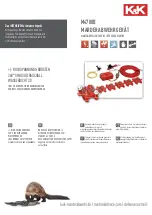
209
Quick Start
Home Setup
The example application calls for setup of the following parameters:
Home Reference –The example calls for a Home to Sensor; therefore, “Sensor” is selected
as the home reference. Because of this selection, the home profile will travel at its target
velocity until the Home.0.SensorTrigger is activated. Figure 88, shows the Home.0.Sensor
Trigger has been assigned to ModuleInput.2.
Velocity – The home move travels at this velocity, until the home reference is seen and then
stops. If the motor overshoots the sensor, a reverse move is initiated. Other functions may
cause additional motion. The example application uses a Home Velocity of 20 inches/min.
Acceleration – Is the average acceleration rate used to accelerate to the target velocity. The
example uses an acceleration rate of 100 inches/min/sec.
Index Setup
The example application calls for two Absolute Indexes, and one Incremental Index. Select
one of the indexes from the hierarchy window. Figure 91 shows Index0.
Absolute Index
Figure 91:
Index Setup View (Absolute Type)
Indexes 0 and 1 are both Absolute type indexes and use the following parameters:
Index Name - Is a 12-character string that gives a descriptive name to an index.
Index Type – Select the desired type of index from the list box. Index0 has been defined as
an Absolute type of index. This means the load will travel to an exact position with respect
to the home reference point. This index will cause motion in either a positive or negative
direction depending on current position of the load with respect to the home reference point.
Position – Is a signed value that specifies the absolute position for the load at the completion
of the index. For absolute indexes, direction of travel is determined by the starting position
of the index. Index 0 has a Position of 10 Inches, and Index 1 has a Position of 0 Inches.
Velocity – Is the target velocity of the index profile. The velocity parameter is unsigned and
is always greater than zero. Direction of the index is not determined by the velocity, but by
the Distance/Position parameter. Velocity of the indexes in the example are 100 inches/min.
Acceleration – Is the average acceleration rate used when accelerating to the target index
velocity.
Deceleration - Is the average deceleration rate used when decelerating to zero speed, or to the
new target velocity.
Incremental Index
The following parameters were setup for Index2:
Index Name - Is a 12-character string that gives a descriptive name to an index.
Summary of Contents for FM-3
Page 2: ......
Page 14: ...xii ...
Page 16: ...2 FM 3 Programming Module Reference Manual Figure 2 FM 3 Programming Module Features ...
Page 128: ...114 FM 3 Programming Module Reference Manual ...
Page 156: ...142 FM 3 Programming Module Reference Manual ...
Page 196: ...182 FM 3 Programming Module Reference Manual ...
Page 238: ...224 FM 3 Programming Module Reference Manual ...
Page 251: ...237 Diagnostics and Troubleshooting Figure 97 Diagnostic Cable DGNE Diagram ...
Page 262: ...248 FM 3 Programming Module Reference Manual ...
Page 264: ...250 FM 3 Programming Module Reference Manual AX4 CEN CDRO ...
Page 265: ...251 Specifications Cable Diagrams ...
Page 266: ...252 FM 3 Programming Module Reference Manual SNCE XXX Cable SNCDD 001 5 Cable ...
Page 267: ...253 Specifications SNCO 003 Cable SNCI 003 Cable ...
Page 268: ...254 FM 3 Programming Module Reference Manual SNCLI 003 Cable ...
Page 272: ...258 FM 3 Programming Module Reference Manual TIA XXX Cable DDS XXX Cable ...
Page 274: ...260 FM 3 Programming Module Reference Manual CMDS XXX Cable CMMS XXX Cable ...
Page 275: ...261 Specifications CFCS XXX Cable ...
Page 276: ...262 FM 3 Programming Module Reference Manual CFCO XXX Cable ...
Page 277: ...263 Specifications CFOS XXX Cable ...
Page 278: ...264 FM 3 Programming Module Reference Manual ...
Page 286: ...272 FM 3 Programming Module Reference Manual ...
Page 290: ...276 FM 3 Programming Module Reference Manual ...
Page 291: ......
















































